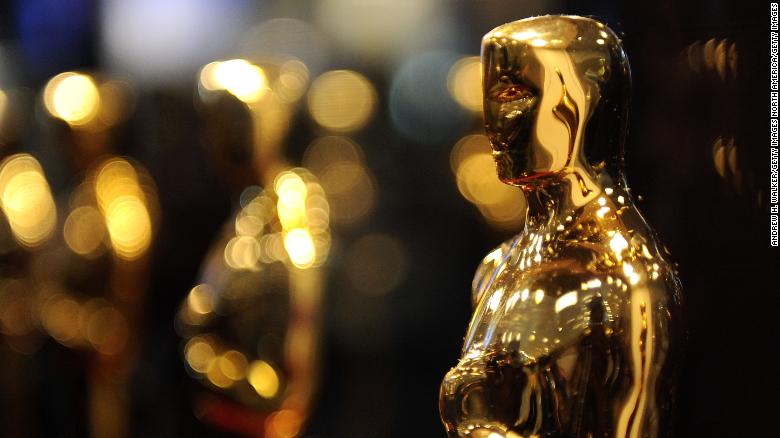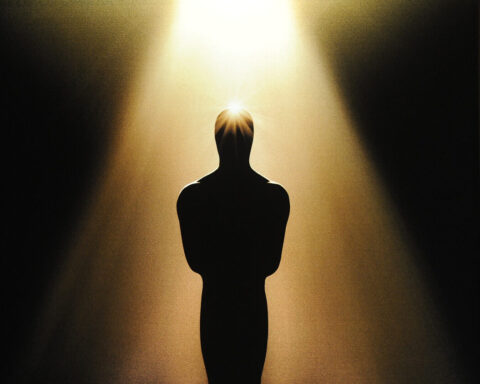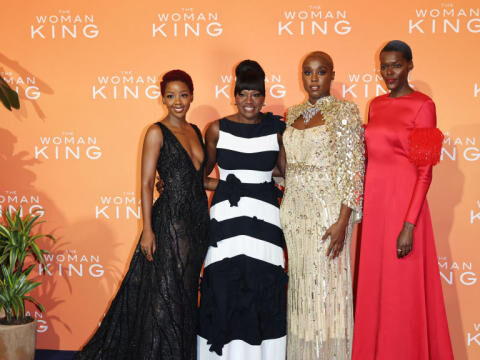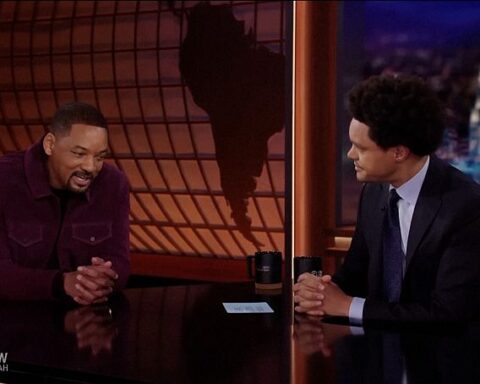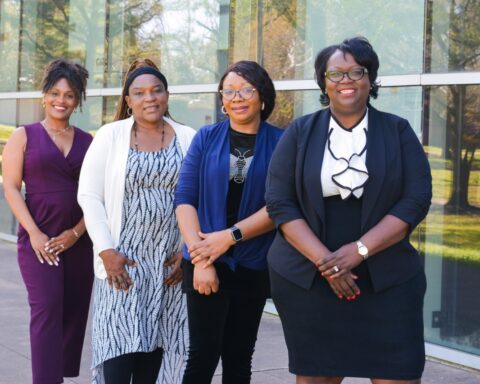Even before the title sequence plays, this year’s Academy Awards will go down in history. The Covid-19 pandemic, shifting the ceremony to a later date (only the fourth time ever) and upending the roster of eligible films, means that on April 25, before any little gold men are even awarded, a very different kind of event will play out.
But this year’s event is set to be memorable for who might scoop up top honors. Five years after #OscarsSoWhite first gained momentum, Garrett Bradley, the documentary filmmaker behind “Time,” the late actor Chadwick Boseman and filmmaker Chloé Zhao all stand to make history — the kind that’s long overdue and much needed for women filmmakers and people of color.
It’s the kind of history that arguably only the Oscars, by virtue of their stature in the film industry, can make.
If Zhao wins for “Nomadland,” she’ll be the first woman of Asian descent to land an Oscar in that category. She and Emerald Fennell, British director and screenwriter of “Promising Young Woman,” are both up for best director — the only two women in this category, itself known for consistently leaving deserving women directors out. (The most recent snubs include: Greta Gerwig for “Little Women,” Marielle Heller for “Can You Ever Forgive Me?” and “A Beautiful Day in the Neighborhood,” Lulu Wang for “The Farewell,” Alma Har’el for “Honey Boy,” and Regina King who should’ve been in contention this year for “One Night in Miami.”)
Before Fennell and Zhao, only five women directors have ever been nominated for best director, with “The Hurt Locker” making Kathryn Bigelow the sole woman to win this category in the 92-year history of the Oscars.
Should Zhao or Fennell be victorious, it would mark a large step forward.
But there is still another area where the Oscars continues to fall far too short: recognizing women composers. At last year’s event, Hildur Guðnadóttir won the best original score for “Joker.” Her win was an anomaly — she was the first woman in 23 years to win the category. It’s an industry category whose greatest visibility comes at Oscar time, which makes this a critical moment to take stock of the systemic lack of opportunity for women composers in the field that keeps them largely invisible, despite the groundbreaking work so many of them do.
The Iceland-born, Berlin-based composer remains only one of four women ever to win for this category (one of whom, Marilyn Bergman, shared it with her husband). Back in the day, it used to be awarded in two categories, drama and musical or comedy. And, as of last year, only seven women have ever been nominated in the score categories at all.
Now, a year after Guðnadóttir said in her acceptance speech, “to the girls, to the women, to the mothers, to the daughters, who hear the music bubbling within, please speak up,” no woman is in the running for best original score. Lolita Ritmanis made it to the shortlist of 15 for scoring the Latvian film, “Blizzard of Souls,” but she didn’t go on to be included in the final list of nominees.
When King accepted her Golden Globe for best supporting actress in 2019 for “If Beale Street Could Talk,” before going on to win the Oscar, she challenged those in positions of power within the film industry to work towards gender parity. Frances McDormand (nominated this year for best actress for “Nomadland”) made a similar appeal the year before, when she called for inclusion riders as part of her best actress acceptance speech. Yet, the industry continues to fail in uplifting women composers.
It’s not that the women aren’t there or that they’re not speaking up, as Guðnadóttir put it; a number of organizations have initiatives to train and mentor upcoming composers, like the Sundance Institute Film Music Program, which has an equal number of women participants, and the ASCAP Film Scoring Workshop, which seeks to help get women access into the industry.
It’s that women are still not being given the opportunities to score the types of films that go on to be honored at the Oscars, Ritmanis, one of the founders of the Alliance for Women Composers, told me.
From the most recent figure available, only 6% of the 250 highest grossing films in 2018 were composed by women, according to a study by the Center for the Study of Women in Television and Film based on numbers from Box Office Mojo. Similarly, a 2018 studyby the University of Southern California revealed that for the top 100 fictional films at the box office every year from 2007 to 2017, only 16 women composers were hired, compared with more than 1,200 men.
But just because they haven’t been hired for the bigger films or acknowledged with awards doesn’t mean women composers haven’t been there all along. They have always been transforming the genre, from the days of French composer Germaine Tailleferre, paving the way with her early travelogues in the mid-1920s to Bebe Barron in the 1950s, molding the electronic sound of “Forbidden Planet” and inspiring sci-fi scores that followed, including Wendy Carlos’ seminal synthesizer-driven work on “A Clockwork Orange” and “The Shining” (alongside Rachel Elkind).
Just because pioneering American composer Shirley Walker wasn’t even mentioned in the In Memoriam portion of the 79th Academy Awards (while Basil Poledouris, with whom she had collaborated and who died that same year, was), doesn’t mean she wasn’t helping shape the careers of Danny Elfman and Hans Zimmer, or working her piano magic for Carmine Coppola on “Apocalypse Now,” or breathing life into the animated “Batman” and ‘Superman” series.
Even casual film fans know the names Elfman and Zimmer — and many also know Ennio Morricone, Alexandre Desplat and James Newton Howard. But by now, the likes of Mica Levi, Anne Dudley, Miriam Cutler, Starr Parodi and Debbie Wiseman should be just as familiar too.
We know of the storied relationships between directors and composers, from Bernard Hermann and Alfred Hitchcock to Steven Spielberg and John Williams. Where are the tales of women who have influenced masterpieces? That’s my question after Ritmanis said to me: “I wish directors and executives would pause before they go on to hire the same person they always hire … It really is like a boys club.”
Rachel Portman agreed. The British composer became the first woman — after 52 years of the category’s existence — to win the Oscar for her work on “Emma.” That was 24 years ago. In the years following her win, Portman said that having an Oscar really helped her in getting over people who might have been a bit more reticent about hiring her.
“I’ve been expecting things to change for women composers all this time much more than they have,” she told me recently. “I don’t have answers, only more questions. I wonder if the root of the cause is the perception that women can’t handle big films? I’ve noticed women directors often work with women composers.”
Indeed, before Turkish composer Pinar Toprak wrote the score for “Captain Marvel,” co-directed by Anna Boden, she became the first woman to score a Marvel film by writing additional music for Elfman’s “Justice League” score. But it isn’t always the case; some women filmmakers continue to give these opportunities to men, as Tim Greiving noted in the New York Times in 2019. “Wonder Woman 1984,” directed and co-written by Patty Jenkins was scored by Zimmer and “Mulan,” directed by Niki Caro, was done by Harry Gregson-Williams.
But achieving gender parity is possible. Four years ago, Mirette Seireg founded Mpath Music, a production music library that became the first of its kind to have half of its songs composed by women. Despite the stats, Seireg intentionally sought out talented women and created a welcome platform for historically underrepresented composers to thrive.
The music branch of the Academy of Motion Picture Arts and Sciences has also worked to improve the involvement of women, thanks to the likes of Laura Karpman and Kathryn Bostic, who became the first African American woman score composer to join the Academy (and only just in 2016). But as the curtain falls on another awards season, we have to remember that cheering some forms of progress toward gender equity can’t mean letting up on the big picture of the structural change that is still needed.
In the meantime, I’m keen to see what the new crop of composers do, like Elena Charbila, who both acts and scores films as Kid Moxie, leaning on dark, 1980s sensibilities. I want to see more partnerships like director Dee Rees and composer Tamar-kali, who’ve worked together on “Pariah” and “Mudbound.”
And, like Ritmanis, I want to see the women composers who’ve continued on, with or without acclaim, be given their flowers now while they’re still with us. Examples include Emmy-nominated Miriam Cutler, for all the dozens of documentary scores she’s created, like “The Hunting Ground” and “RBG,” Starr Parodi, for blazing a trail across film, movie trailers and TV as the only woman in “The Arsenio Hall Show” band, Debbie Wiseman, for continuing to bring classical influences to contemporary dramas, and others whose music we still may not yet have heard.

